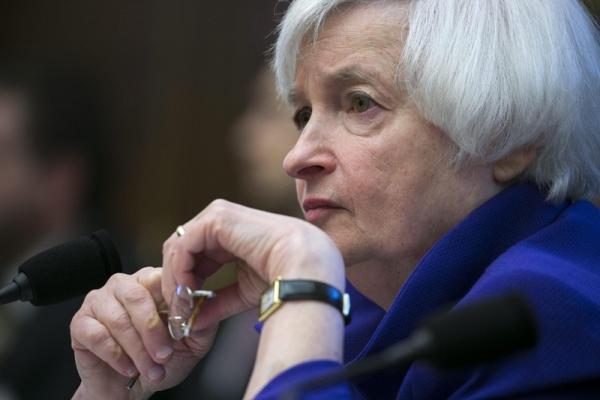Investing.com - The Federal Reserve could rival the White House as a source of volatility in the week ahead, as U.S. central bank chief Janet Yellen testifies before Senate and House committees on the economy and monetary policy.
Investors will also keep an eye out on a few U.S. economic reports, with Wednesday's inflation and retail sales data in the spotlight, for further clues on the timing of the next Fed rate hike.
Meanwhile, in the U.K., market participants will be looking ahead to reports on consumer prices, employment and retail sales for further indications on the continued effect that the Brexit decision is having on the economy.
Elsewhere, Germany is to publish preliminary data on fourth-quarter economic growth on Tuesday for further hints on the strength of the euro zone's economy.
Preliminary data on Japanese fourth-quarter growth will also be in focus, amid concerns over recent yen strength and its implication on economic growth prospects.
Ahead of the coming week, Investing.com has compiled a list of the five biggest events on the economic calendar that are most likely to affect the markets.
1. Fed Chair Yellen Testifies
Federal Reserve Chair Janet Yellen is set to deliver her semi-annual monetary policy testimony on the economy before Senate and House committees in Washington DC.
Yellen is scheduled to testify on the economy before the Senate Banking Committee at 10:00AM ET (15:00GMT) Tuesday. On Wednesday, she will appear in front the House Financial Services Committee also at 10AM ET.
Her comments will be monitored closely for any new insight on policy and the timing of when it might raise interest rates.
The Fed left borrowing costs unchanged earlier this month and gave no firm signal on the timing of its next rate hike.
Fed fund futures are pricing in a less than 15% chance of a rate hike in March, according to Investing.com’s Fed Rate Monitor Tool. However, odds of a June increase was seen at more than 65%.
The U.S. central bank has previously projected three rate increases this year. However, traders remained unconvinced, with markets continuing to price in just two rate hikes during the course of this year.
2. U.S. January Inflation & Retail Sales
The Commerce Department will publish January inflation figures at 8:30AM ET (13:30GMT) Wednesday. Market analysts expect consumer prices to ease up 0.3%, while core inflation is forecast to increase 0.2%.
On a yearly base, core CPI is projected to climb 2.1%. Core prices are viewed by the Federal Reserve as a better gauge of longer-term inflationary pressure because they exclude the volatile food and energy categories. The central bank usually tries to aim for 2% core inflation or less.
Rising inflation would be a catalyst to push the Fed toward raising interest rates.
At the same time Wednesday, the Commerce Department will publish data on January retail sales. The consensus forecast is that the report will show retail sales rose 0.1% last month, after gaining 0.6% in December. Core sales are forecast to inch up 0.4%, after rising 0.2% a month earlier.
Rising retail sales over time correlate with stronger economic growth, while weaker sales signal a declining economy. Consumer spending accounts for as much as 70% of U.S. economic growth.
Besides the inflation and retail sales reports, this week's calendar also features U.S. data on producer prices, industrial production, building permits, housing starts, initial jobless claims, as well as surveys on manufacturing conditions in the Philadelphia and New York regions.
Headlines from Washington will most likely continue to dictate market sentiment in the week ahead, as traders focus on President Donald Trump for further details on his promises of tax reform, infrastructure spending and deregulation as well as trade policies.
Earnings from the likes of PepsiCo (NYSE:PEP), Cisco (NASDAQ:CSCO), Kraft Heinz (NASDAQ:KHC) and AIG (NYSE:AIG) are also on the radar this week.
3. U.K. CPI, Employment & Retail Sales for January
The U.K. Office for National Statistics will release data on consumer price inflation for January at 09:30GMT (4:30AM ET) on Tuesday. Analysts expect consumer prices to rise 1.9%, after increasing 1.6% a month earlier.
At 09:30GMT (4:30AM ET) Wednesday, the ONS will publish the monthly jobs report. The claimant count change is expected to rise by 1,000 in January, with the jobless rate holding steady at 4.8%. Wage growth including bonuses is forecast to rise 2.8%.
On Friday, the ONS will produce a report on January retail sales at 09:30GMT (4:30AM ET), with analysts expecting an increase of 1.0%, following a drop of 1.9% in the preceding month.
The Bank of England raised its forecasts for growth and inflation earlier this month, but appeared in no rush to raise interest rates.
4. German, Euro Zone Q4 GDP
Germany will publish a preliminary report on fourth-quarter economic growth at 07:00GMT (2:00AM ET) on Tuesday. The euro zone's largest economy is forecast to expand 0.5% in the October-December period, compared to growth of 0.2% in the preceding quarter.
The euro zone will release revised fourth-quarter growth data shortly afterwards at 10:00GMT (05:00AM ET). An initial estimate published late last month showed that the region's economy grew 0.5% in the three months ended December 31, accelerating from growth of 0.4% in the third quarter.
5. Japan Fourth-Quarter GDP
Japan will publish preliminary fourth-quarter economic growth data at 23:50GMT (6:50PM ET) on Sunday. The report is expected to reveal that Japan's economy expanded by just 0.3% in the final three months of 2016, maintaining pressure on policymakers to support the world's third largest economy.
Stay up-to-date on all of this week's economic events by visiting: http://www.investing.com/economic-calendar/
